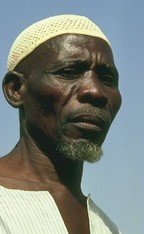Jola-Bliss in Senegal

Photo Source:
Bethany World Prayer Center
|
Send Joshua Project a map of this people group.
|
| People Name: | Jola-Bliss |
| Country: | Senegal |
| 10/40 Window: | Yes |
| Population: | 72,000 |
| World Population: | 72,000 |
| Primary Language: | Jola-Kasa |
| Primary Religion: | Islam |
| Christian Adherents: | 7.00 % |
| Evangelicals: | 0.30 % |
| Scripture: | New Testament |
| Ministry Resources: | Yes |
| Jesus Film: | Yes |
| Audio Recordings: | Yes |
| People Cluster: | Atlantic-Jola |
| Affinity Bloc: | Sub-Saharan Peoples |
| Progress Level: |
|
Introduction / History
The Jola Bliss (also known as the Diola-Kasa because of their language) are located in the southwestern corner of Senegal. The Jola-Kasa tongue is a member of the Niger-Congo family of languages. It is spoken by the Jola-Bliss people who are concentrated in Oussouye.
What Are Their Lives Like?
Little is known about the specific culture and traditions of the Jola-Bliss; thus, some assumptions have been made in this profile based on the lifestyles of the neighboring groups. A variety of crops are raised in this region, using very basic tools. Maize, manioc and rice are the staples, but squash, melons, sweet potatoes, peppers and tomatoes are also crops they grow. Major tree crops include bananas, coconuts, mangoes and papayas. The Jola-Bliss raise cattle, sheep and goats but do not use their milk. Dogs and chickens are seen in almost every village. Hunting is of less importance than agriculture, but there is a considerable gathering of wild fruits and roots; berries; and kola, shea and palm nuts. The Jola-Bliss live in extended family compounds, each consisting of a cluster of huts usually arranged in a circle around an open space. Often the entire compound is surrounded by a fence, hedge or wall. The compounds usually adjoin to form compact villages. In general, the dwellings are round with mud walls and cone-shaped, thatched roofs. However, many local variations exist.
In the Jola Bliss community, men hunt, fish, clear the land and tend cattle. The women do the gathering and help in the agricultural work. Chiefs exercise political authority in the village. Succession usually passes to the next brother or the oldest son of the deceased's elder sister.
Males are circumcised during initiation ceremonies at puberty. These ceremonies typically involve a period of instruction in an isolated "bush school." The Jola Bliss prefer cousins as marriage partners. The family of the husband-to-be pays her family a bride price. He also provides bride service to her family as well. There is polygamy, but it's limited. If it happens each wife has a hut, and the husband spends a fixed period with each on a rotation basis.
What Are Their Beliefs?
About three-fourths of the Jola-Bliss are Muslim. The rest are either Christians or ethnic religionists. Muslim or Christ, almost all have ties with the spirit world.
What Are Their Needs?
The Jola-Bliss people need reliable sources of clean water. Clean water would protect them from sickness and disease.
Prayer Points
Ask the Lord of the harvest to send laborers to work among the Jola Bliss of Senegal.
Ask the Lord to save key leaders among the Jola Bliss who will use their influence to disciple many others.
Pray that signs and wonders will follow the Jola Bliss believers as they share Christ with their families and friends.
Pray for them to taste and see that the Lord is good.